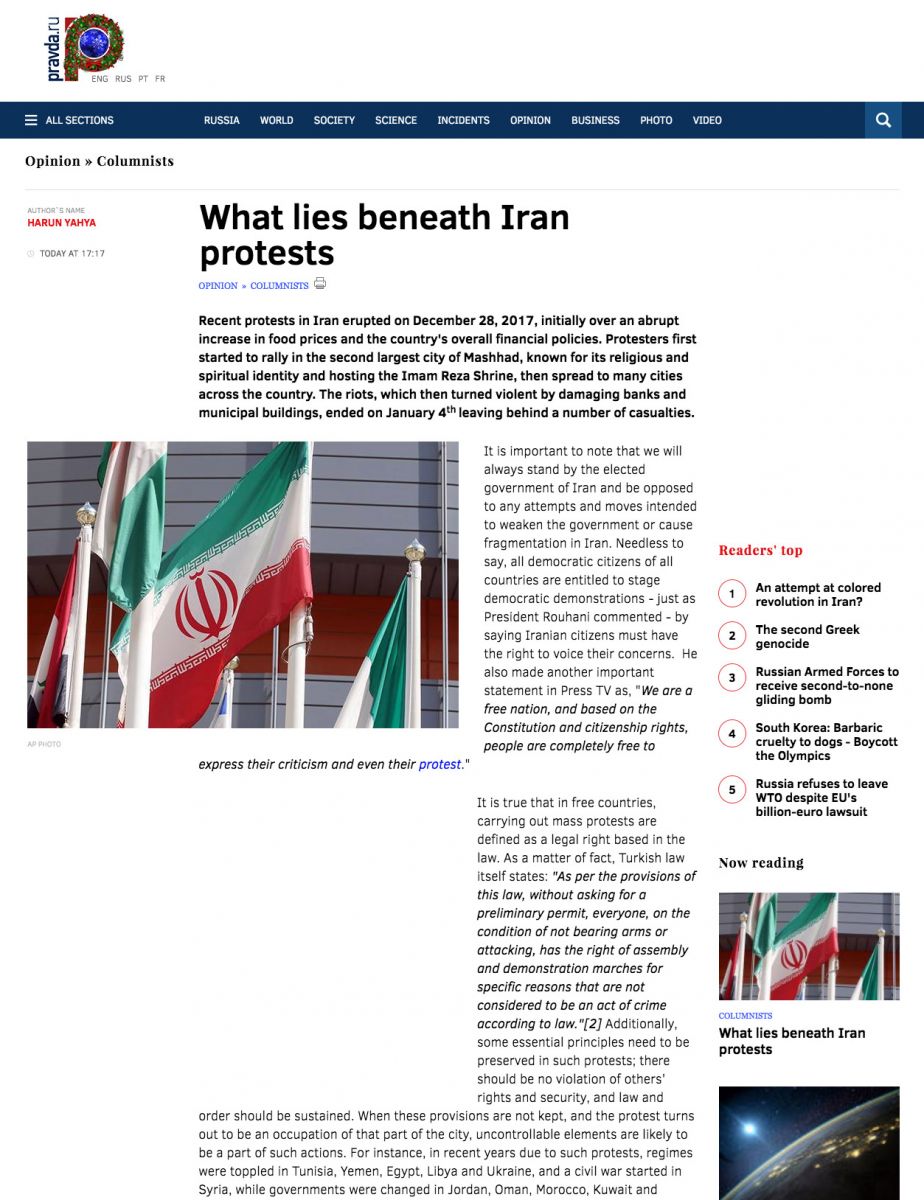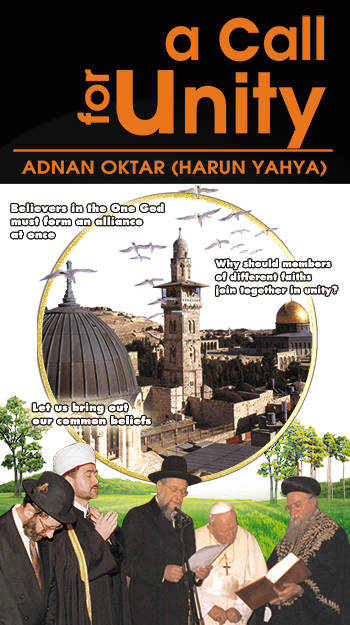Bigotry: The Dark Danger
What lies beneath Iran protests

Recent protests in Iran erupted on December 28, 2017, initially over an abrupt increase in food prices and the country's overall financial policies. Protesters first started to rally in the second largest city of Mashhad, known for its religious and spiritual identity and hosting the Imam Reza Shrine, then spread to many cities across the country. The riots, which then turned violent by damaging banks and municipal buildings, ended on January 4th leaving behind a number of casualties.
It is important to note that we will always stand by the elected government of Iran and be opposed to any attempts and moves intended to weaken the government or cause fragmentation in Iran. Needless to say, all democratic citizens of all countries are entitled to stage democratic demonstrations - just as President Rouhani commented - by saying Iranian citizens must have the right to voice their concerns. He also made another important statement in Press TV as, "We are a free nation, and based on the Constitution and citizenship rights, people are completely free to express their criticism and even their protest."
It is true that in free countries, carrying out mass protests are defined as a legal right based in the law. As a matter of fact, Turkish law itself states: "As per the provisions of this law, without asking for a preliminary permit, everyone, on the condition of not bearing arms or attacking, has the right of assembly and demonstration marches for specific reasons that are not considered to be an act of crime according to law."[2] Additionally, some essential principles need to be preserved in such protests; there should be no violation of others' rights and security, and law and order should be sustained. When these provisions are not kept, and the protest turns out to be an occupation of that part of the city, uncontrollable elements are likely to be a part of such actions. For instance, in recent years due to such protests, regimes were toppled in Tunisia, Yemen, Egypt, Libya and Ukraine, and a civil war started in Syria, while governments were changed in Jordan, Oman, Morocco, Kuwait and Lebanon. Again, social peace and order was severely disrupted in Iraq, Bahrain, Sudan, and Algeria.
Some foreign intelligence agents and fringe groups, with very different agendas than that of the protesters, try to exploit the vulnerability of the society in question and infiltrate the masses. For example, the sinister structure known as the British deep state has been concocting schemes for the Middle East and has been actively working to stage a plot against the strong countries of the region like Iran, Russia and Turkey because of their success in trying to end the bloodshed in Syria through Astana Peace Talks. One of the main methods of this establishment is to provoke the people against their governments; ultimately, that would lead to the fragmentation of countries through separatist violence or coup attempts.
Such methods were used and failed; first in 2009 in Iran, when the Reformist candidates' allegations of fraud in the presidential elections of the same year poured massive crowds into the streets demanding a change. This "Green Movement" was considered as the biggest civil unrest in Iran since the 1979 Islamic Revolution. Supreme leader Ayatollah Khamanei accused the American billionaire George Soros, who implemented the idea in the name of color or velvet revolutions, of trying to interfere in the 2009 riots.[3] It is a well-known fact that Soros funds the various youth organizations that contributed to the ousting of administrations in Poland, Serbia, Georgia, and Ukraine.[4] It is also noteworthy that the Brookings Institute prepared a report on Iran in June of 2009 called "Which path to Persia? Options for a new American strategy toward Iran." In this report, it is stated that "...the most obvious and palatable method of bringing about its [the Iranian regime] demise would be to help foster a popular revolution along the lines of the 'velvet revolutions' that toppled many communist governments in Eastern Europe beginning in 1989."[5] The term 'color' or 'velvet' is intended to soften the image and make people believe that these incidents are peaceful protests. However, despite their innocent-sounding names, these have always brought destruction, bloodshed and suffering. Soros himself admits in The Bubble of American Supremacy how he uses this method as a tactic:
...working in countries whose government is hostile may be even more rewarding. [In hostile countries] it is important to support civil society to keep the flame of freedom alive. By resisting government interference, the foundation may be able to alert the population that the government is abusing its authority.[6]
Turkey saw its share of color revolutions during the Gezi incidents in 2013, in which demonstrators initially demanded the preservation of Gezi Park as a recreational area; protests then quickly spread to other cities of the country in a weirdly organized way and turned into armed and bloody uprising demanding the fall of government. Also, the failed coup attempt of July 15, 2016 was another plot against Turkey, which was thwarted by patriotic Turkish citizens who protected their country. Iran and Russia were always on Turkey's side from the very beginning of this disaster.
Such stirring outcomes may have been realized by the employment of social media which has been popular in the last decade. Social media becomes an instrument for organizing, stirring and agitating the masses that are assumed to join the demonstrations just as they did in the 2009 Green Movement, the 2013 Gezi Park and recently in Iran's protests. The fact that those who tweet about these trends in Twitter regarding Iran are from foreign countries prove that these incidents are being organized by the British deep state. This is the classical tactic of the British deep state but they won't work anymore since people are aware of these plots.
It is vital that Turkey and Russia to be on alert to foil any plots to stir up trouble Iran. Other Muslim countries should also not remain unresponsive to the incidents in Iran and should act in the beginning before such marches progress into violent acts. On the other hand, Iran should respond to the peaceful protesters' demands in terms of the economy and employment to make a better life standard for its citizens. Iran's recent statement regarding the easing of punishments for violating the country's conservative dress code for women is greatly appreciated. Women are a significant segment of the society and should have more rights to partake in many duties including the government. Moreover, it would be a good progress for the youth - who make up nearly three-quarters of the population - to be able to voice their economic grievances and for officials to meet their needs through dialogue.
[1] https://www.nytimes.com/2017/12/31/world/middleeast/iran-protests.html
[2] Law on Assembly and Demonstration Marches, Article 3
[3] https://www.al-monitor.com/pulse/originals/2017/05/iran-khamenei-warning-election-unrest-2017-vote.html
[4] Kjetil Fosshagen, "Arab Spring: Uprisings, Powers, Interventions", Berghahn Books, 2014, pp. 13-14
[5] https://www.brookings.edu/wp-content/uploads/2016/06/06_iran_strategy.pdf
[6] The Shadow Party: How George Soros, Hillary Clinton, and Sixties Radicals Seized Control of the Democratic Party, David Horowitz and Richard Poe, p. 231
Adnan Oktar's piece in Pravda'da (Russia):
http://www.pravdareport.com/opinion/columnists/10-01-2018/139658-iran_protests-0/
2018-01-11 13:06:08






